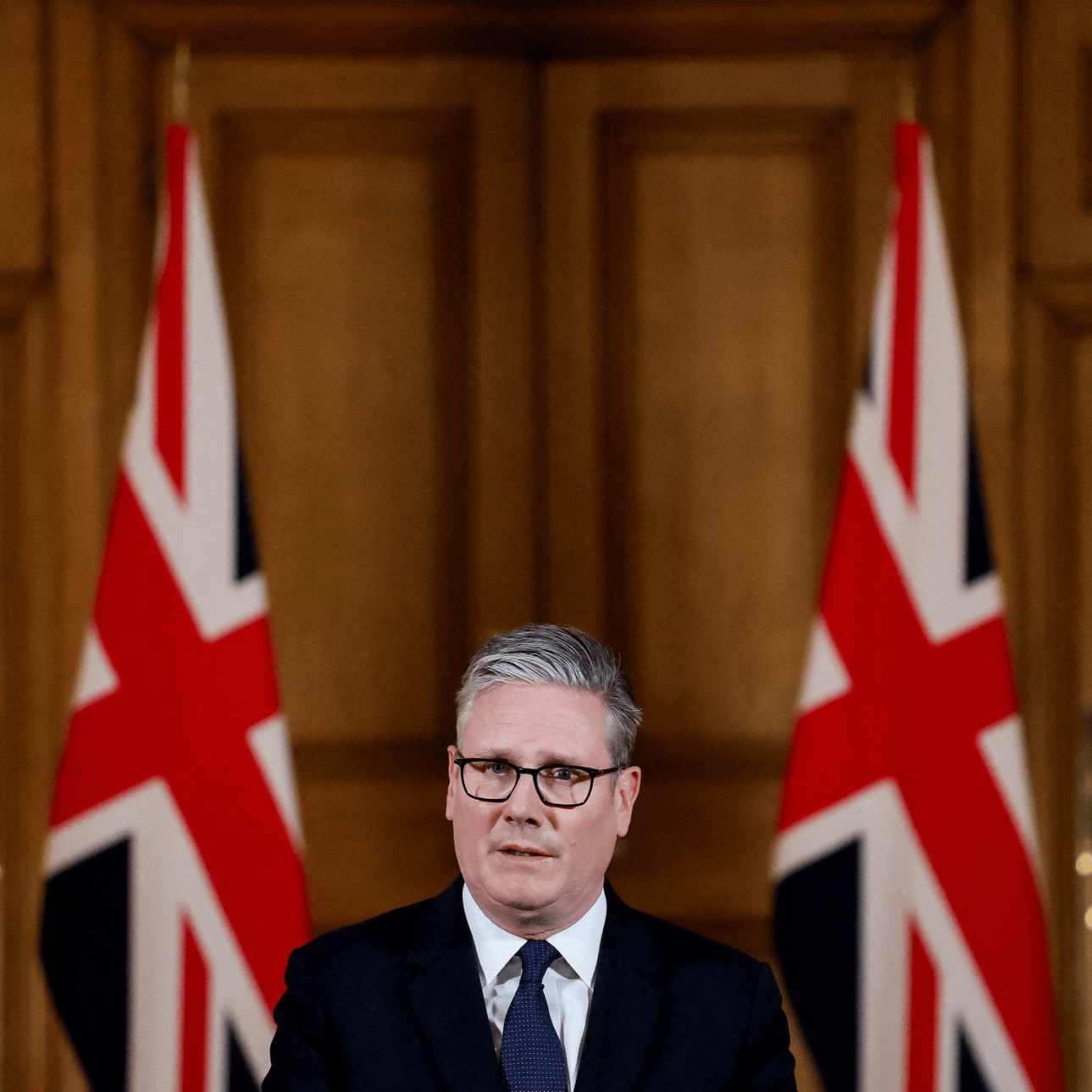- The Knowledge
- Posts
- Is Keir Starmer right about recognising Palestine?
Is Keir Starmer right about recognising Palestine?
🐋 Predator practice | 🥂 Dînatoires | 🔢 Crowd counting
In the headlines
Benjamin Netanyahu has criticised Keir Starmer’s pledge to recognise Palestinian statehood in September unless Israel ends the war in Gaza, saying it “rewards Hamas’s monstrous terrorism”. The British PM laid down the ultimatum yesterday, saying Israel needed to agree a ceasefire deal, commit to a two-state solution and pledge not to annex the occupied West Bank. Tsunami waves have hit the coasts of Russia, Hawaii, Japan and California after an 8.8-magnitude earthquake – one of the strongest ever recorded – struck off Russia’s Kamchatka Peninsula early this morning. Millions of people have been told to evacuate in affected areas, but so far there have been no reports of any injuries or fatalities. The Lionesses celebrated their Euros win with an open-top bus parade down The Mall yesterday. Some 65,000 fans came out to support the victorious team, dressed in red and white and waving England flags. “I’ve been crying all the way down The Mall,” said captain Leah Williamson. “This is unbelievable.”

Getty
Comment

The PM announcing the ultimatum yesterday. Toby Melville/AFP/Getty
Is Keir Starmer right about recognising Palestine?
I used to be wary of Britain recognising Palestinian statehood, says former foreign minister Tobias Ellwood in The Independent. It’s a “card that can only be played once”, so it must be used wisely. That time, as Keir Starmer has acknowledged, has come. The scale of continued suffering in Gaza can no longer be justified by Israel’s right to defend itself. There is no roadmap towards a long-term solution, and any support from the “eager-to-help” international community – Egypt, Jordan, the UAE, America – on establishing a post-conflict governance structure is being rejected. Britain cannot afford to wait around endlessly for the “perfect moment” to take this crucial step in pushing for a two-state solution. The longer we hold off, the longer this “endless war will continue”.
Sorry, but this is a disgraceful act of diplomacy, says Jake Wallis Simons in The Daily Telegraph. Of course the war in Gaza is horrendous; of course Israel has made mistakes. But promising to recognise Palestinian statehood without making any demands of Hamas – specifically the release of the remaining hostages – will only embolden the jihadis. Why would they release their captives and surrender now, when they know the world is “on their side”? This is already playing out: it was the growing international condemnation of Israel that led Hamas to harden its stance at ceasefire talks in Qatar last week, leading to the negotiations breaking down. So why is Starmer taking this decision? Well, just look at the cabinet members pressing him to do so: Justice Secretary Shabana Mahmood, whose Birmingham constituency has a Muslim population of 46%; Health Secretary Wes Streeting, whose London seat is 23% Muslim. “A pattern emerges here.” The prime minister appears to care more about domestic politics than peace in the Middle East. It’s “as hypocritical as it is deplorable”.
Advertisement
Were you charged hidden fees on your motor finance? You could be owed thousands!
Millions of drivers trusted their motor finance providers, but many were unknowingly charged hidden commission. If you financed a car from 2007 onwards, you could be due compensation. The FCA has stated that £20 billion could be due to UK car buyers. We make the claims process simple—no complicated paperwork, no stress. Just a free check to see if you’re owed money back. It only takes a minute to check. Click below and find out if you qualify! Start your claim now.
Nature
A pod of orcas has been filmed practising its killing technique off the coast of Western Australia, says James Halpin in The Sun. In a “grisly lesson” led by the group’s matriarch, one of the young killer whales acts as a “body double” for the victim by stopping swimming, while the others practise drowning the “prey” by forcing it underwater where it cannot breathe. Their normal target, blue whales, can typically last for around 90 minutes beneath the surface, so in a real hunt it can take the murderous mammals several hours to exhaust and kill their victim. To watch the full footage, from a forthcoming BBC series narrated by David Attenborough, click on the image.
Noted
The latest round of doctors’ strikes has had a decidedly mixed reception, says Polly Toynbee in The Guardian. And quite right too. Their union, the British Medical Association, is “kicking a government that has been well-disposed towards it”. Health Secretary Wes Streeting ended last year’s strikes by giving junior doctors a generous 22% pay rise, and he is handing them a further above-inflation 5.4% bump this year. The public no longer support industrial action: some 52% “somewhat” or “strongly” oppose it. And as Keir Starmer has warned, the strikes are “playing into the hands” of those on the right who are willing the NHS in its current form to fail.
Games

If you want to know how good you are guessing crowd numbers, says Matt Muir in Web Curios, give Crowdle a go. It’s dead simple: every day there are five photos of different-sized crowds, and you have to guess how many people are in each one. The closer you are to the actual number, the more points you get. Try it here.
Comment

Getty
Thinking is becoming a “luxury good”
It’s pretty clear by now that technology is damaging our ability to concentrate, says Mary Harrington in The New York Times. Personally, if I need to focus on something for more than a few minutes, “I have to put my phone in a drawer or in another room”. What receives less attention is that this is creating “another form of inequality”. Think of it like junk food. As ultra-processed snacks have become cheaper and more widely available, obesity has become “strongly correlated with poverty” – essentially, a gulf has opened up between people with the time and money to sustain healthy lifestyles and those without. Today’s media environment – filled with fake news, clickbait and “AI-generated slop” – is the “cognitive equivalent of the junk food aisle”.
Less affluent children already spend on average two more hours per day on screens than their more affluent peers, enough to result in “worse working memory, processing speed, attention levels, language skills and executive function”. And the rich are more easily able to confront the problem. Some hire nannies who are required to sign “no phone” contracts, or send their children to expensive schools where the devices are banned or heavily restricted. Many US states are starting to limit student smartphone use, but it’s naive to think such rules will be implemented with the “same determination” in huge public schools as they are in small-class private schools. The truth is that making “healthy cognitive choices” is hard. In a culture where platforms like TikTok offer a “bottomless pit” of enthralling, short-form content, thinking will soon become a “luxury good”.
🤳🙈 My Instagram followers have given me some great suggestions for getting out of the habit of constantly looking at my phone, says Sophia Money-Coutts on Substack. They include: turning your device’s settings to greyscale so that everything on screen is less appealing; deleting all social media apps; downloading Brick or some other app that restricts your usage at certain times; wrapping rubber bands around the screen, which “makes it almost impossible to scroll”; and, perhaps as a last resort, clapping every time you think about picking your phone up (“You’ll look/feel so silly that you’ll stop”). For more tips click here.
Zeitgeist

Instagram/@delices_deden
The latest hosting trend for luxury brands is the dînatoire, says Harrison Vail in Air Mail: a mix between a cocktail party and a formal dinner. Guests aren’t “anchored to a formal dinner placement” but will still be given food “worthy of social media”, rather than the paltry finger food usually associated with standing events. “You’re getting more than crudités, you can float in and out, and you won’t be stuck next to someone dull,” says the co-founder of a Gen Z marketing firm – and it means PRs can “open up the guest list” without having to stress about last-minute RSVP changes.
On the money
Copper traders are taking extreme measures to get shipments of the metal to the US before the Trump Administration’s 50% tariffs come into effect on Friday, says Bloomberg. One bulk carrier which left Australia earlier this month has changed its destination from New Orleans to Hawaii, shaving almost 20 days off the voyage time. On arrival, they may also pay extra to skip the queue at customs. You can see why they’re rushing: the difference for a big shipment between arriving before the levy comes into effect and after it is more than $70m.
Snapshot

Snapshot answer
It’s Michele Dougherty, says Kaya Burgess in The Times, the first woman to be appointed Britain’s Astronomer Royal in the role’s 350-year history. Born in South Africa, the 62-year-old planetary scientist was inspired to learn more about space after using her father’s telescope in the garden. She has worked at Imperial College since 1991, and in 2005 was responsible for the “shock discovery” of water on Enceladus, one of Saturn’s moons, which is now considered one of the most exciting places to look for alien life. Her main duty, she says, will be making the public “excited” about science. “Isn’t it nice to get excited about things?”
Quoted
“Conscience is the inner voice that warns someone may be looking.”
HL Mencken
That’s it. You’re done.
Let us know what you thought of today’s issue by replying to this email
To find out about advertising and partnerships, click here
Been forwarded this newsletter? Try it for free
Enjoying The Knowledge? Click to share



Reply